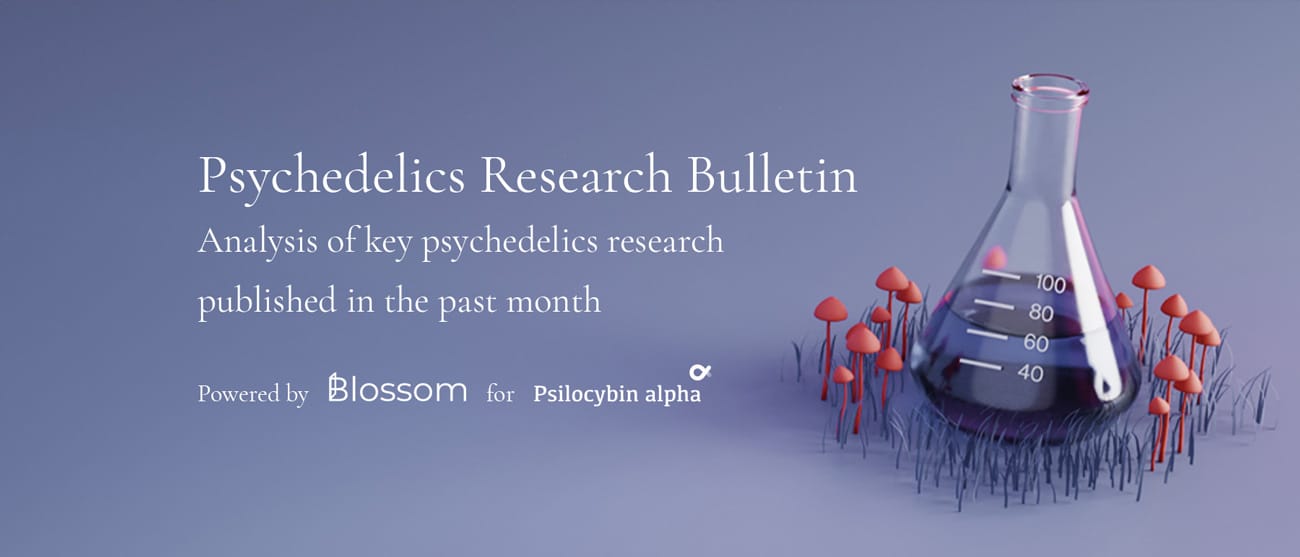Psychedelic research in April pitted psychedelics against SSRIs, gave mice a break from tripping, and identified new psychedelics. As we’re awaiting the full results of the MAPS Phase III MDMA trial data, let’s look back at key research published last month.
Psilocybin vs SSRI Antidepressants
This month’s most important and most debated study investigated psilocybin (2 high doses) and Escitalopram (six weeks), delivered in conjunction with psychotherapy. The double-blind study investigated the effects on depression and found psilocybin was more effective on most measures. Unfortunately, however, the primary and pre-registered measure—a self-reported depression questionnaire—failed to report statistically significant differences between the groups.
Find Blossom’s analysis, and links to other commentaries on this important study, on their page dedicated to this paper. We also covered this paper in our Weekly Bulletin, in which Boris Heifets shared his thoughts.
What if we can have our cake without experiencing that we ate it?
Is it possible to separate the potential positive long-term effects of psychedelics from the acute, subjective effects? A new study in mice finds that administering ketanserin before psilocybin did precisely that.
Psychological support (as per the ACE model) is possibly one of the big drivers in the psilocybin vs. SSRI trial’s success; and, mice are not men. But, perhaps non-hallucinogenic psychedelics (which may need a new name/classification) can be part of our mental healthcare toolbox.
Discovering molecules that may be non-hallucinogenic might get a lot easier with PsychLight. This innovative technique that highlights serotonin receptor activity has already been used in mice and can purportedly predict hallucinogenic potential. Part of the same team is also responsible for tabernanthalog, a non-hallucinogenic analog of ibogaine with anti-addictive potential.
Bipolar depression and psychedelics
Bipolar depression (BD; previously manic depression) affects about a third as many people as (major) depression (MDD). Currently, there is very little research on the use and safety of psychedelics for those suffering from BD.
Two recent reviews cover ketamine and psilocybin use for BD. The studies with ketamine look promising. A review investigated the data from six studies with 135 participants. It found a response for 61% of patients versus only 5% in the placebo control group.
A pre-print investigated the use of psilocybin and the risk of activating mania. The 15 case studies, of which four involved psilocybin, showed that there is indeed a risk. A study from last February also highlighted the risk of combining lithium (commonly used by those with BD) and psychedelics.
Further studies with ketamine
Ketamine could be used for the treatment of PTSD finds a new review. A study from January showed a response in 67% of patients, but the effects weren’t sustained a month later.
The cognitive function of patients receiving ketamine treatment was also investigated. The study showed only minor differences between those with MDD or PTSD and healthy control subjects. It also found that baseline cognitive function didn’t predict clinical outcomes.
The final ketamine study this month is an opinion article that investigates how ketamine works. It argues that the fast-acting antidepressant effects are a product of heterogeneous (enhancing and suppressing) neuroplasticity.
Putting ayahuasca into context
A large international survey with nearly 6900 participants investigated the influence of context and setting on mental health and wellbeing outcomes. A combination of motivation, ceremony, and support variables predict these outcomes in a new model proposed in this paper.
An updated review of ayahuasca for substance use disorders (SUDs; e.g., alcoholism found that it helped people (and mice) consume fewer substances and improve mental health and wellbeing scores.
The studies in this review weren’t double-blind placebo-controlled (RCT) trials. However, more and more RCT studies with ayahuasca are being conducted.
One such study this month found, counter to earlier research, that ayahuasca didn’t reduce the recognition of fearful face stimuli. Researchers use this as an indication of social cognition. One possible explanation of the null-finding could be the dose used in the study.
Three other studies reported outcomes from studies with ayahuasca. The first showed varying changes in sub-scores on a depression scale. The second investigated the intent of Western users of ayahuasca (and also reported positive effects on SUDs). And the third analyzed seven case studies of adverse reactions for first-time users.
Additional psychedelic studies this month
A very well-controlled study finds both positive and negative effects on creativity during and after the use of psilocybin. Although not much love has been given to the Default Mode Network (DMN), this study found that decreased integrity of the DMN was the strongest predictor of the observed effects.
Microdosing psilocybin increased awe and aesthetic experiences for a group of 30 participants. The researchers point out that many of them were aware that they received a placebo or psilocybin, and expectancy effects could be at play again.
A final look inside the brain shows us that LSD and psilocybin reduce top-down hierarchical organization.
Seasoned researchers weigh in on how psychedelic research can be conducted in the future. One paper argues for more real-world data and digital health solutions. A second speaks specifically about psychedelics and end-of-life care. And a third paper highlights ethical and legal issues that therapists face when working with psychedelics.
The Research Bulletin is powered by Blossom, a psychedelic research database. Blossom helps you find scientific insights in this blossoming era of psychedelic research. Find the latest papers in the database, search with useful filters, and learn about new topics in high-level reports.


